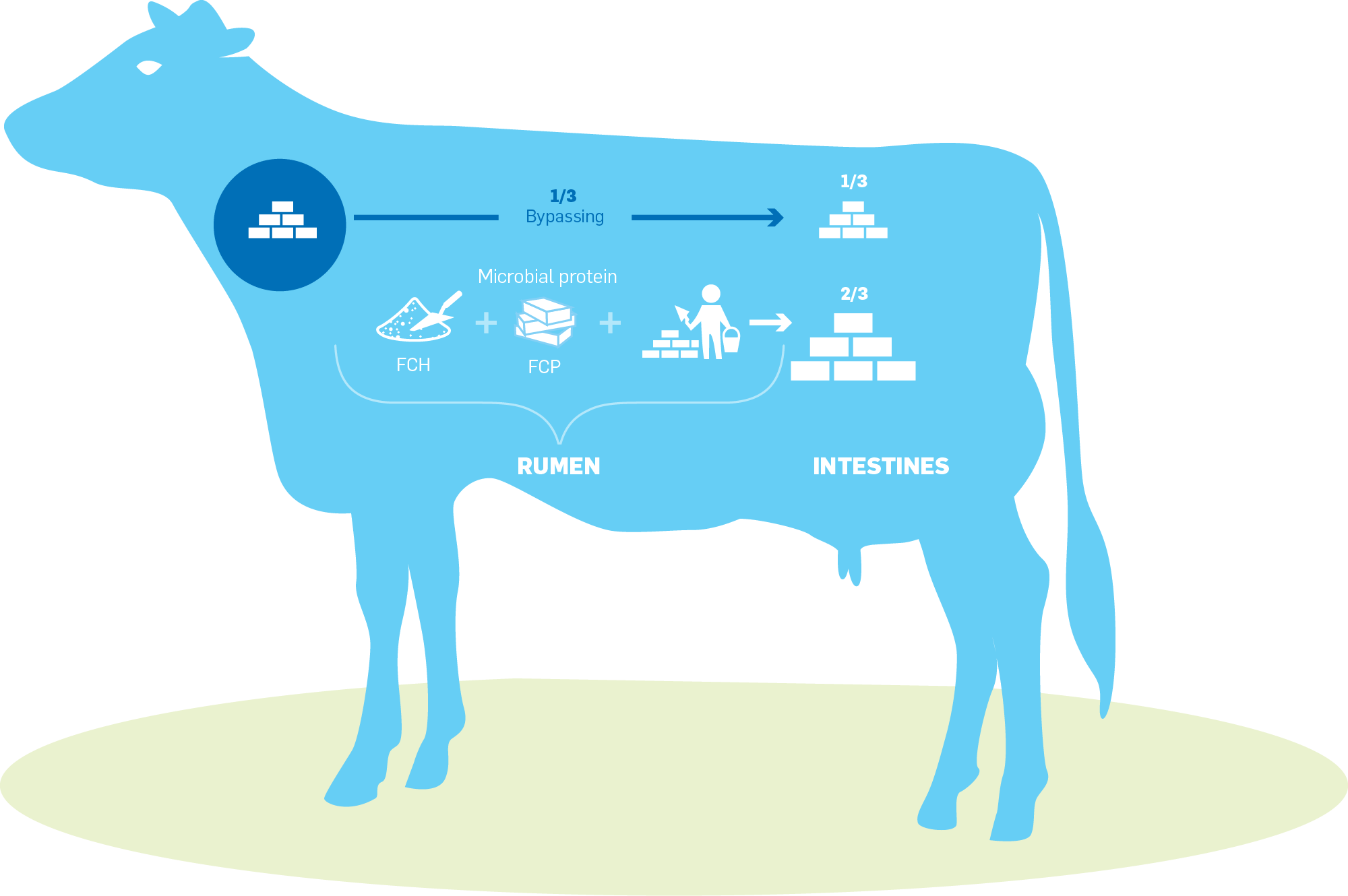How a balanced rumen enhances your animals’ health
For a farm to function well, it has to be healthy. The same goes for the cows on a farm. Healthy cows are more efficient, resulting in optimal milk production. What’s more, animals that look healthy and produce milk easily enhance the dairy farmer’s work satisfaction. One of the factors contributing to a cow’s good health is a well-balanced rumen. So what do you need to do, to ensure your cows have healthy rumens?

How to spot rumen problems
Rumen problems can be caused by a variety of factors. The specialists at De Heus regularly encounter rumen acidosis, for example. This is a metabolic disease caused by highly digestible ('fast') grass silage. In practice, the first and second-cut silage is much faster than anticipated, even though they appear to be slowly fermentable.
You can spot the onset of rumen acidosis by using your sense of touch, sight and smell. Beware of silage where the grass seems to have little structure, low dry-matter content and an excessively sour smell. If you notice any of these signs, you may need to adjust your ration. If you fail to spot these signs, look out for a number of other typical symptoms among your dairy cows. For example, there may be changes in the manure. The cow's rear will often appear to be 'dirty'. And the cow may start to foam at the mouth. In a somewhat more advanced stage, the cow may lie down with its head facing the rumen.
Another potential change is a drop in milk production for a longer period of time for no apparent reason. In modern farms, the milking robot will often record less activity. All these signs could point to a rumen that is no longer healthy.
Milk production may also become moderate and contain fewer solids. The fat concentration in particular may be on the low side. If the rumen is unstable for a prolonged period, it may have a negative effect on fertility and cause hoof problems as well.
What you can do
If you notice these kinds of changes, contact a De Heus specialist for help. Together we can look for ways to reduce the fermentation speed. We start by checking whether we can use different roughage on your farm. This kind of silage can be easily combined with fast-fermenting silage. The key is to look for slower-fermenting feeds with sufficient structure.

If correcting the problem with different silage is not an option, then you should consider using supplements. There are several possibilities. One is to give each cow at least 150 grams of sodium bicarbonate a day. This can be administered at the feed fence, but the best method is to add the sodium bicarbonate in the mixer wagon.
A further solution is to correct the ration by using soy hulls or other structure-rich products such as hay and rapeseed straw. It is important to switch to feed pellets with a high level of crude fibre. De Heus offers a wide range of pellets for dairy cows suited for every need. This includes slowly fermentable feed. The cows will look better, become more active and produce better manure.
How grazing affects the rumen
If you decide to transition to grazing, it is important that the cows have optimal rumen health before you start so they can properly digest fresh grass, which may also be quickly fermentable. It’s also important to keep in mind that the composition of fresh grass varies greatly, for example due to weather conditions. If the rumen is not healthy, the cow may struggle to accommodate these changes.
This also applies if you keep your herd inside and feed fresh grass at the feed fence. That is why it is important to make the transition to fresh grass correctly. The transition to grazing should be done in phases. First, let the cows out during the afternoon only, for example. Once the rumen has had a chance to adjust properly, extend the grazing time. This will keep the rumen stable and enable the cows to get used to the changes. Importantly, it also minimises the risk of rumen acidosis.
What else affects the rumen?
In truth, any situation involving changes for the cow can potentially upset the rumen balance. Stressful situations, in particular, can cause rumen acidosis, such as the period around calving. Cows that have recently calved may have a lower feed intake than desired, which may cause rumen problems. These cows often consume less roughage (and therefore less structure-rich food), because they may not have fully recovered yet.
You can help these cows by stimulating feed intake and ensuring they consume sufficient crude fibre. In that respect, the period before calving is important too. Preparing properly for the dry period will give cows the support they need.
A hands-on, targeted approach
The De Heus Natural Power approach is designed to help you maintain the optimal rumen balance for your animals and consistently improve animal health on your farm. Our hands-on Natural Power Programme connects all of these insights and more to provide you with the tools needed to improve animal health and performance on your farm, supporting the prudent use of antibiotics.
Click here to learn more about the Natural Power programme or contact a member of the De Heus team for more information.
About the author

Wim Hofman
International Ruminants specialist